
By: Moira Rayner
Wednesday 29 August 2007
Original on New Matilda -also pdf

Dally Messenger and the ACCC
PRINT AND INTERNET Media ARTICLES
COMMONWEALTH OF AUSTRALIA
Copyright Regulations 1969
Warning
This material has been reproduced and communicated to you by or on behalf of the
INTERNATIONAL COLLEGE OF CELEBRANCY pursuant to Part VB of the Copyright Act 1968.
The material in this communication may be subject to copyright under the Act.
Any further reproduction or communication of this material by you may be the subject of copyright protection under the Act.
 |
Modern Values: The Business of Death By: Moira Rayner Wednesday 29 August 2007 Original on New Matilda -also pdf |
 |
|---|
When someone you love dies, society expects you to arrange two things: a ceremony or rite of passage to honour the deceased person; and the dignified disposal of their body.
Funeral celebrants are asked by funeral directors — who have already signed up the bereaved family — to arrange a meaningful farewell for their dad, grandma, wife or child, for around $20 an hour. You’d pay more to have your house cleaned. The ACCC has moved a very long way from its original purposes. And the law has come a long way from Lionel Murphy’s ideal of accessible, affordable justice. When someone you love dies, ring your funeral celebrant first. About the author: Moira Rayner is a freelance writer, lawyer and consultant based in Melbourne. |
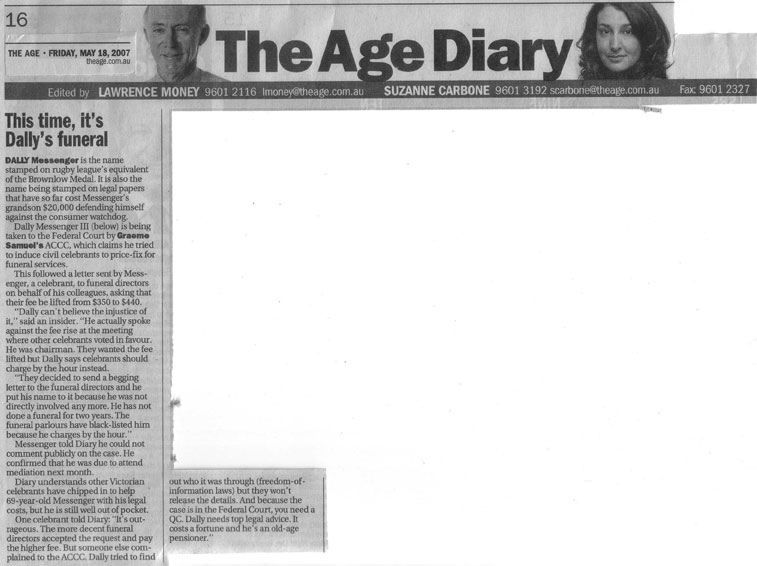
This time, it's Dally's funeral
DALLY Messenger is the name stamped on rugby league's equivalent of the Brownlow Medal. It is also the name being stamped on legal papers that have so far cost Messenger's grandson $20,000 defending himself against the consumer watchdog. Dally Messenger III is being taken to the Federal Court by Graeme Samuel's ACCC, which claims he tried to induce civil celebrants to price-fix for funeral services. This followed a letter sent by Messenger, a celebrant, to funeral directors on behalf of his colleagues, asking that their fee be lifted from $350 to $440. "Dally can't believe the injustice of it," said an insider. "He actually spoke against the fee rise at the meeting where other celebrants voted in favour. He was chairman. They wanted the fee lifted but Dally says celebrants should charge by the hour instead. "They decided to send a begging letter to the funeral directors and he put his name to it because he was not directly involved any more. He has not done a funeral for two years. The funeral parlours have black-listed him because he charges by the hour." Messenger told Diary he could not comment publicly on the case. He confirmed that he was due to attend mediation next month. Diary understands other Victorian celebrants have chipped in to help 69-year-old Messenger with his legal costs, but he is still well out of pocket. One celebrant told Diary: "It's outrageous. The more decent funeral directors accepted the request and pay the higher fee. But someone else complained to the ACCC. Dally tried to find out who it was through (freedom-of-information laws) but they won't release the details. And because the case is in the Federal Court, you need a QC. Dally needs top legal advice. It costs a fortune and he's an old-age pensioner." |
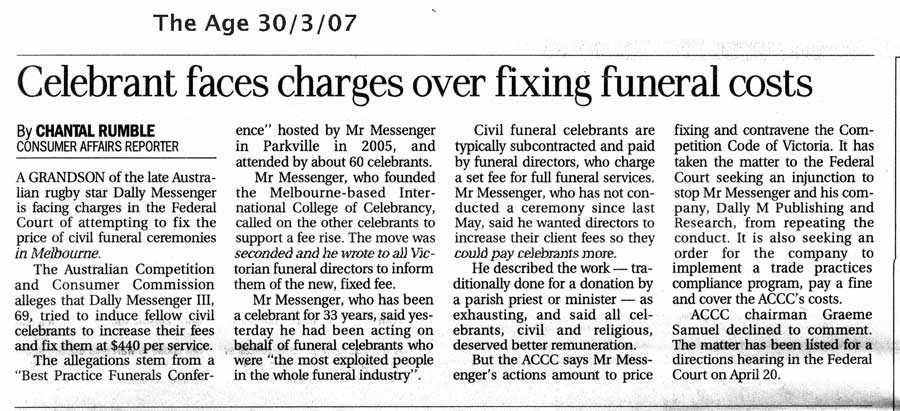
Celebrant faces charges over fixing funeral costs
Chantal Rumble
March 30, 2007
--
A GRANDSON of the late Australian rugby star Dally Messenger is facing charges in the Federal Court of attempting to fix the price of civil funeral ceremonies in Melbourne.
The Australian Competition and Consumer Commission alleges that Dally Messenger III, 69, tried to induce fellow civil celebrants to increase their fees and fix them at $440 per service.
The allegations stem from a "Best Practice Funerals Conference" hosted by Mr Messenger in Parkville in 2005, and attended by about 60 celebrants.
Mr Messenger, who founded the Melbourne-based International College of Celebrancy, called on the other celebrants to support a fee rise. The move was seconded and he wrote to all Victorian funeral directors to inform them of the new, fixed fee.
Mr Messenger, who has been a celebrant for 33 years, said yesterday he had been acting on behalf of funeral celebrants who were "the most exploited people in the whole funeral industry".
Civil funeral celebrants are typically subcontracted and paid by funeral directors, who charge a set fee for full funeral services. Mr Messenger, who has not conducted a ceremony since last May, said he wanted directors to increase their client fees so they could pay celebrants more.
He described the work — traditionally done for a donation by a parish priest or minister — as exhausting, and said all celebrants, civil and religious, deserved better remuneration.
But the ACCC says Mr Messenger's actions amount to price fixing and contravene the Competition Code of Victoria. It has taken the matter to the Federal Court seeking an injunction to stop Mr Messenger and his company, Dally M Publishing and Research, from repeating the conduct. It is also seeking an order for the company to implement a trade practices compliance program, pay a fine and cover the ACCC's costs.
ACCC chairman Graeme Samuel declined to comment. The matter has been listed for a directions hearing in the Federal Court on April 20.
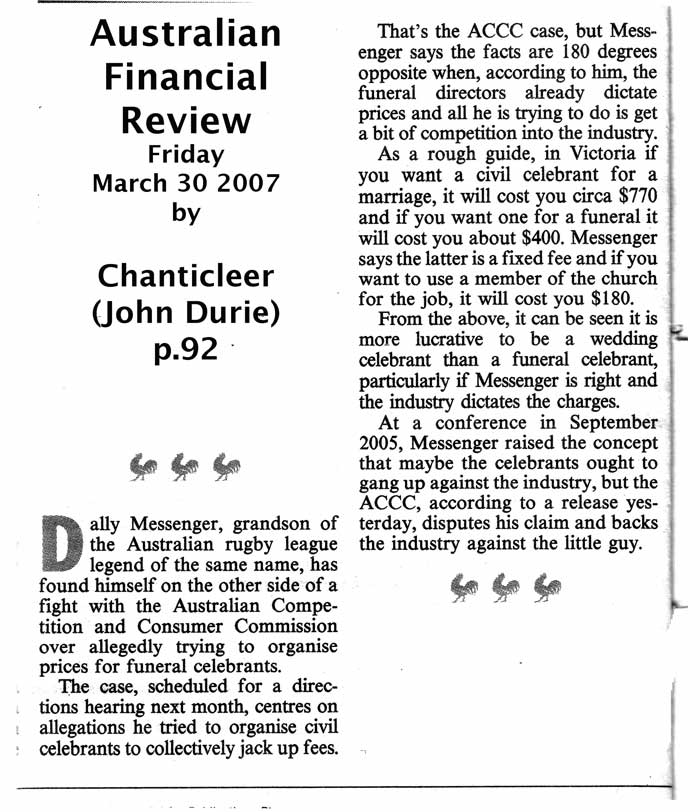
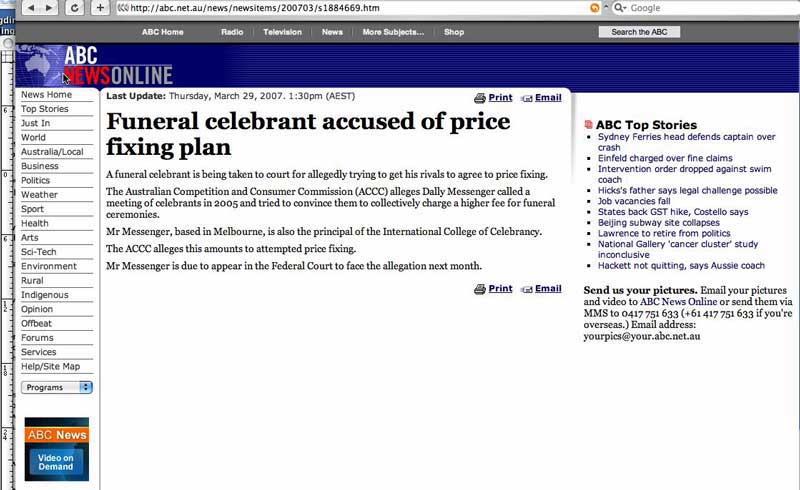
-
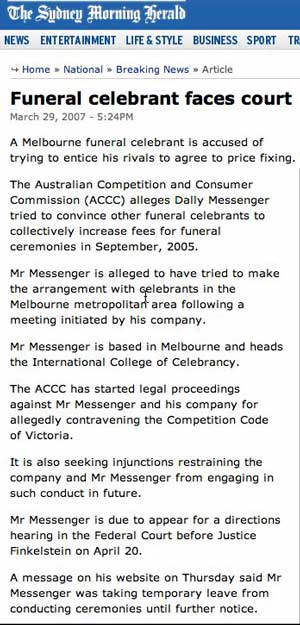 |
 |
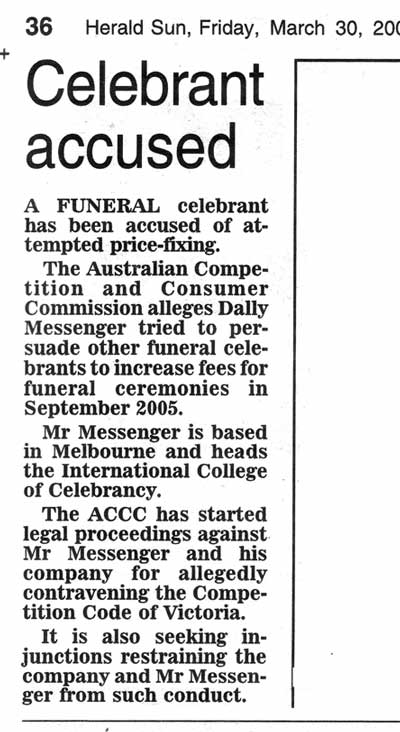 |
|---|
Laughing all the Way to the Bank
Please note in the article below how
Invocare's shares (ie White Lady Funerals, Le Pine, Simplicity Funerals etc- 151 locations and 12 crematoria)
have increased 200% in the last three years. This occured in the same issue of the AFR as the report on D.Messenger.
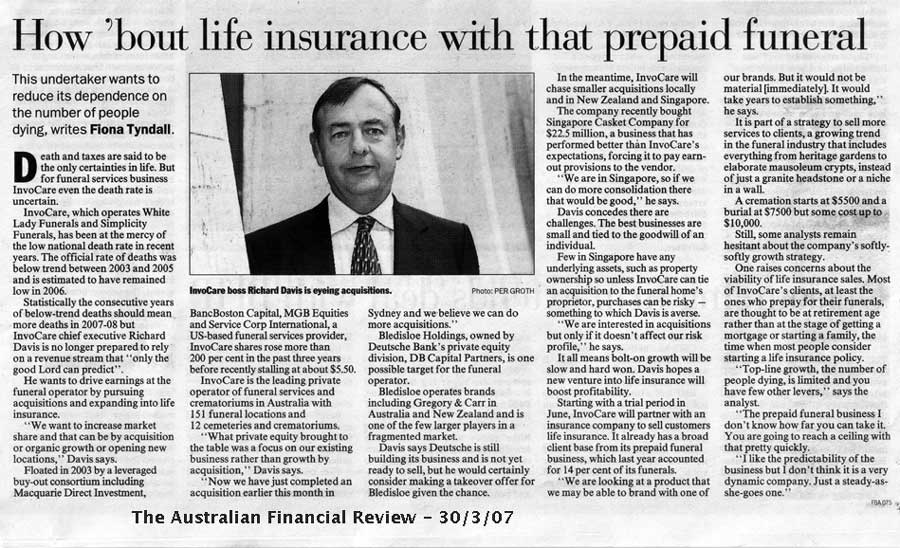

Governments' powers have gone too far, says ex-judge By LEONIE WOOD RETIRING Federal Court judge Ron Merkel has sharply criticised the coercive power amassed by government departments at federal and state level, saying Australians should ask themselves if their political masters deserve their trust.
|